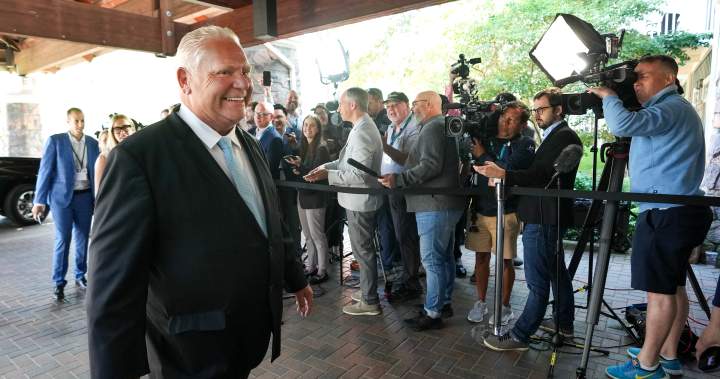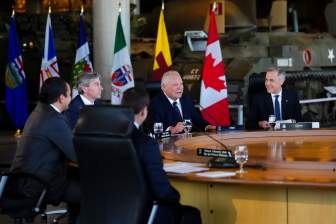Doug Ford is leading the country’s premiers in a potentially tense meeting with several prominent First Nation groups as a push to streamline approvals in the face of tariffs from the United States creates ruptures in the relationship.
Monday’s meeting will include Canada’s premiers and leaders from the Assembly of First Nations, the Métis National Council and the Native Women’s Association of Canada, among other Indigenous groups, for a closed-door discussion.
Ahead of the talks, Victoria Pruden, president of the Métis National Council, said the country must balance “the needs for economic participation that benefits Métis and their citizens and making sure those benefits don’t come at the expense of duty to consult, consultation, respect for Indigenous rights holders in general.”
The event, held on the edges of the Council of the Federation in Huntsville, Ont., comes at a time when tensions between First Nations leaders and the Crown are high.
Last week, a coalition of nine Ontario First Nations lodged a fast-track legal action against the Ford and Carney governments over Bill 5 and Bill C-5, two recent pieces of legislation that give the provincial and federal governments unprecedented power.
Bill 5 is the Ontario version, and Bill C-5 is federal. Both laws include elements that allow cabinet ministers to designate areas or projects as so important that they can bypass environmental and labour laws, regulations and other approvals.
The legal action asks a court to throw out the entirety of Ontario’s Bill 5 and strike out major sections of the federal law. It also threatens injunctions against any projects or areas where the government announces that laws can be bypassed.

Get breaking National news
For news impacting Canada and around the world, sign up for breaking news alerts delivered directly to you when they happen.
Asked about the action on Monday, barely an hour before he was due to sit down with First Nations leaders, Ford suggested the lawsuit had been filed by a minority.
“I understand that’s nine out of what, across the country, 400 or so?” he said, speaking to reporters outside Deerhurst Resort beside Huntsville.
“We’re going to work with them. We want everyone to have an opportunity, I want everyone to prosper, and when they’re sitting there, and they’re living on diesel and they don’t have electricity … they don’t have clean water, these are the things we’re going to focus on. We’re going to support them.”
One of the nine chiefs who brought the legal action last week previously said he thought Ford and Prime Minister Mark Carney didn’t understand the complexities of their concerns.
“I would say they’re less informed,” Alderville First Nation Chief Taynar Simpson said last Thursday. “I would say they need to do some homework on these issues. They need to go back to the history books, they need to listen to elders, they need to listen to First Nations.”
Ford and one of his cabinet ministers have both been forced to apologize to First Nations leaders in recent weeks.
The first time came after Ford made comments about First Nations “coming cap in hand,” for which he apologized. Then, his environment minister had to issue an apology after he asked the federal government to stand down clean drinking water legislation.
Ford repeated his offer to work with First Nations on Monday, promising prosperity through partnership.
“The door is open for them, they’re welcome to walk through that door and partner with the entire country, partner with Ontario to make their lives more prosperous than they’ve ever seen before,” he said. “That’s going to be their choice. I welcome them to make sure they take advantage of the $3 billion.”
As part of the 2025 budget, the Ford government announced $3.1 billion in loans, grants and scholarships to “support Indigenous participation, partnership and ownership in Ontario’s critical mineral supply chain.”
On Monday, Ford added: “I take care of them, and I want to make sure they prosper.”
The meeting between the First Nations leaders and premiers began around 12:30 p.m. and is expected to run for roughly three hours.
— with a file from The Canadian Press
Read the full article here

